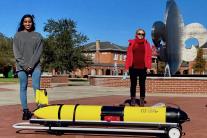Chasing hurricanes in the Gulf of Mexico
Tue, 06/15/2021 - 8:25amCongratulations to Natalia Sidorovskaia, Professor of Physics, and Naomi Mathew, a Ph.D. student in Earth and Energy Sciences, and collaborators Juliette Ioup (University of New Orleans), Roger Waxler (University of Mississippi), and Sean Griffin (Proteus Technologies LLC) on their $600,000 grant from the Department of Defense to study hurricanes in the Gulf of Mexico (DEPSCOR awards for 2020). Remotely piloted underwater robots, called gliders, will record sounds of passing storms in the deep Gulf of Mexico. Then using newly developed physical models, the scientists will estimate the wind speed distribution at different distances from the hurricane eye. Currently, such data can only be collected during reconnaissance flights. Only the USA and Hong Kong operate hurricane hunter’s plane missions. The nature of the collected acoustic data will also offer opportunities for collaborative work to advance the detection of submarine landslides, often associated with storm systems which also could trigger tsunamis, and to understand what happens to the deepwater ecosystem during a passage of the storm. The project aims to enhance the safety of the underwater energy industry infrastructure and the robustness of industrial and military operations and communication during a major storm passage. In the future, underwater reconnaissance could provide a safe and cost-efficient alternative to the expensive and risky reconnaissance flights into the hurricane eye. The technology could be also employed to improve major hurricane and typhoon forecasts in other parts of the world.
Photo: Natalia Sidorovskaia (right) from the Department of Physics and Naomi Mathew (left), a Ph.D. student in Earth and Energy Sciences pose with a glider.

